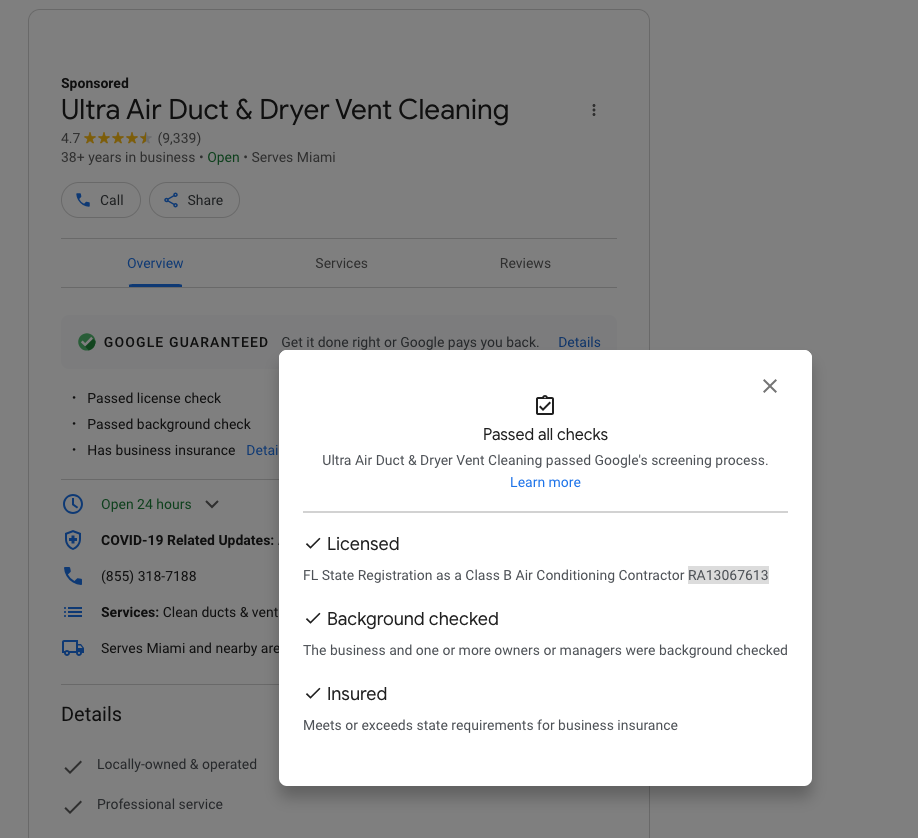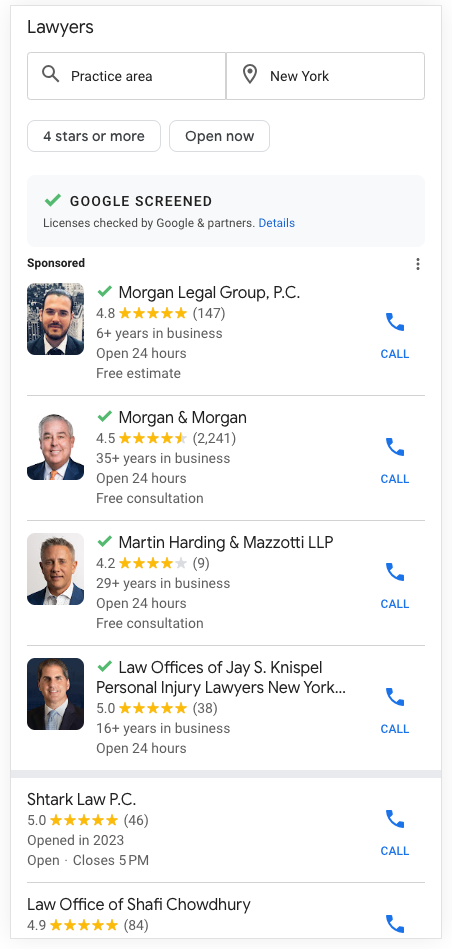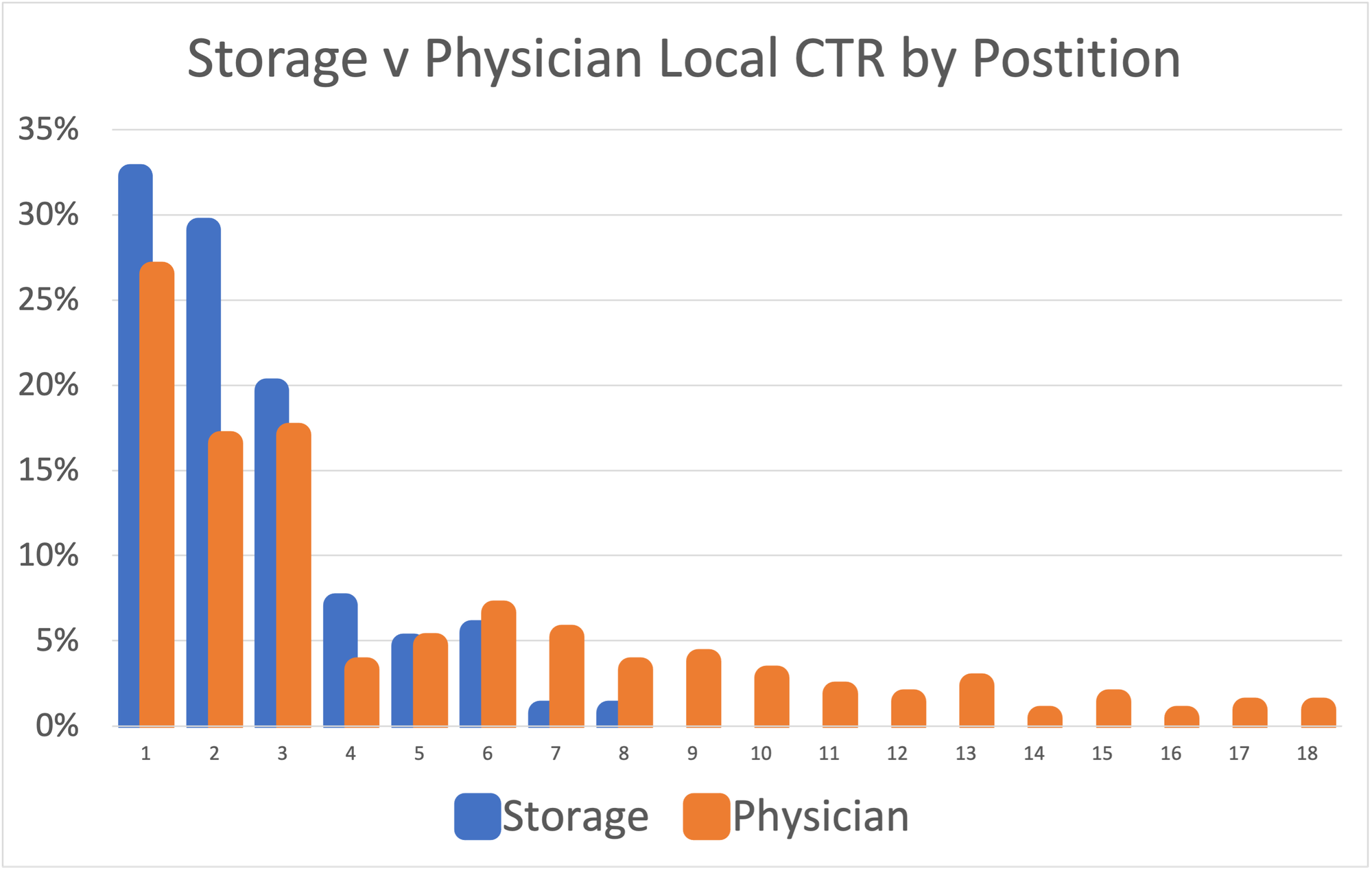LSA Scam Update, Weak LSA Ad Disclosures, Local CTRs

LSA Scam Is Worse than We Thought - Part 4
We reported on the LSA scam of stealing reviews on a grand scale and ripping off customers with inflated quotes for duct cleaning services that aren't actually performed. But it gets worse. These scammers are also stealing FL business licensing numbers required for Google LSA verification from other small, HVAC businesses. In Florida, the deceptive misuse of a license can apparently lead to strict enforcement and a fine from the Florida DBPR, if there are consumer complaints. This puts innocent businesses whose licenses were misappropriated at significant risk. The further we dig into this situation the more it would appear the activities are criminal, not just some business trying to gain a short term advantage. I have been shown unconfirmed reports of similar scams in the UK, controlled by "Albanian, Italian and Israel marketing agencies. Which are in turn controlled by criminal elements in the background." Google and other platforms generally cannot be held accountable for abuses of their online ads because of Sec 230 protections (in the US). Greg Sterling however raises the interesting prospect that since LSA ads seem to entail content largely generated by Google's verification process, and not the advertiser, Sec 230 protection might not apply. Regardless it is hard to believe that Google is unaware of the activity or that the efforts of their "teams ... investigating" have turned up nothing.

Our take:
- Similar to the Locksmith scams of the 2010s, Google is well aware of how its systems can be leveraged for these activities. With LSAs, they theoretically have processes in place to prevent this, which are obviously NOT working.
- The big difference today is that a very few bad actors can achieve broad consumer reach and since theses businesses are "anointed" by Google as "Google Guaranteed" they have high consumer credibility.
- The other difference from the Google locksmith scams: Google now gets ~$50 every time one of these highly ranked bad actors is contacted.
Fast and Loose: LSA Ad Disclosures
This searcher, despite being an ad skeptic, finds LSA ads compelling because of the details present
Google Local Service Ads are compelling to searchers (and to scammers). As you can see in the video, from our consumer research, searchers are attracted to the many relevant visual details in the ad. When present, LSAs "steal" significant clicks from Local and organic results – use of the Local Pack drops from 33% of searches to 18% and organic drops from 57% to 53%. So why is it necessary for Google to scrimp on LSA ad disclosures? I showed a search result for "Lawyers NYC" to a number of search marketers and others familiar with Google ads. Most of them struggled to clearly identify whether results 2 - 4 in the captured screenshot were ads or not (they are). All search engines (e.g., Google) are obligated under FTC guidance to clearly distinguish between ads and natural search results. And yet Google sees fit to increasingly water down the distinction in an already highly clicked ad unit.

Our take:
- The FTC last reviewed and updated search engine disclosure guidelines in 2013 based on input from Danny Sullivan (before he worked for Google).
- Google is fully aware of the guidelines and of how attractive LSA ads are to consumers – hence their continued expansion to new categories.
- It is once again time for the FTC to issue clear and unambiguous guidance to the "search engines."
Local CTR Differences, Opportunities
As with organic CTR, Local CTR by rank can vary a great deal by vertical. In storage, 81% of CTRs occurred in the top 3 positions. No one in our research study went beyond the top 8 links when exploring storage choices. With physicians the CTR tail is much longer and deeper. Many users engaged with the Local Finder and 40% of users went beyond the top 3 to make a choice. Why the big differences between these two categories? Storage is very much a proximity and price play. The marketplace is largely commodified, with many users seeing little difference between one company and another. Physicians, on the other hand, is a higher consideration search. While a choice of physician can be changed later, a new medical relationship is something that users take very seriously. We saw users scroll deep into the Local Finder looking for the "best" doctors (i.e., ratings score). They then clicked through to the website looking for photos of physicians who "looked friendly" or looked like them (race, gender). Many physician listings in the Local Finder had terrible photos and few reviews so users would traverse the depths of the scrollable page looking for 4 or 5 candidates to consider.

Our take:
- In price-sensitive searches we did see brand play a role in the outcome. Building a brand is hard but our research indicates that it would allow for higher pricing in the storage arena.
- In very "personal" categories, like physicians, it is incredibly important that photos be sensitive to gender and racial differences and preferences.
- In both categories, searchers wanted real photos not stock photography. Particularly with physician queries, users noted their distaste for stock photos. It should go without saying: GET RID OF STOCK PHOTOS, hire a pro.
Recent Analysis
- LSA Spam Scam - It's Deja Vu All Over Again, by Mike Blumenthal.
- Near Memo episode 137: Can Gemini Fix Search? The Impact of Google’s Rating Bias, LSA Reviewjacking.
- AI and Your Local SEO Agency, by Greg Sterling.
Short Takes
- Seller ratings now show stars in the organic search results. Every local business should be integrating with Merchant Center and the Google customer review system.
- Experiments from Darren Shaw show that hours is not a binary ranking factor for Local SEO. Being closed doesn't preclude ranking and vice versa.
- In the (near?) future Google will store Location History, Maps Timeline on your mobile device for privacy.
- The Federal Trade Commission has finalized a new rule to combat bait-and-switch tactics and hidden junk fees at car dealers.
- MasterCard announced a natural language AI product for retailer websites that guides customers through product catalogs, from discovery to conversion.
Listen to our latest podcast.

How can we make this better? Email us with suggestions and recommendations.
